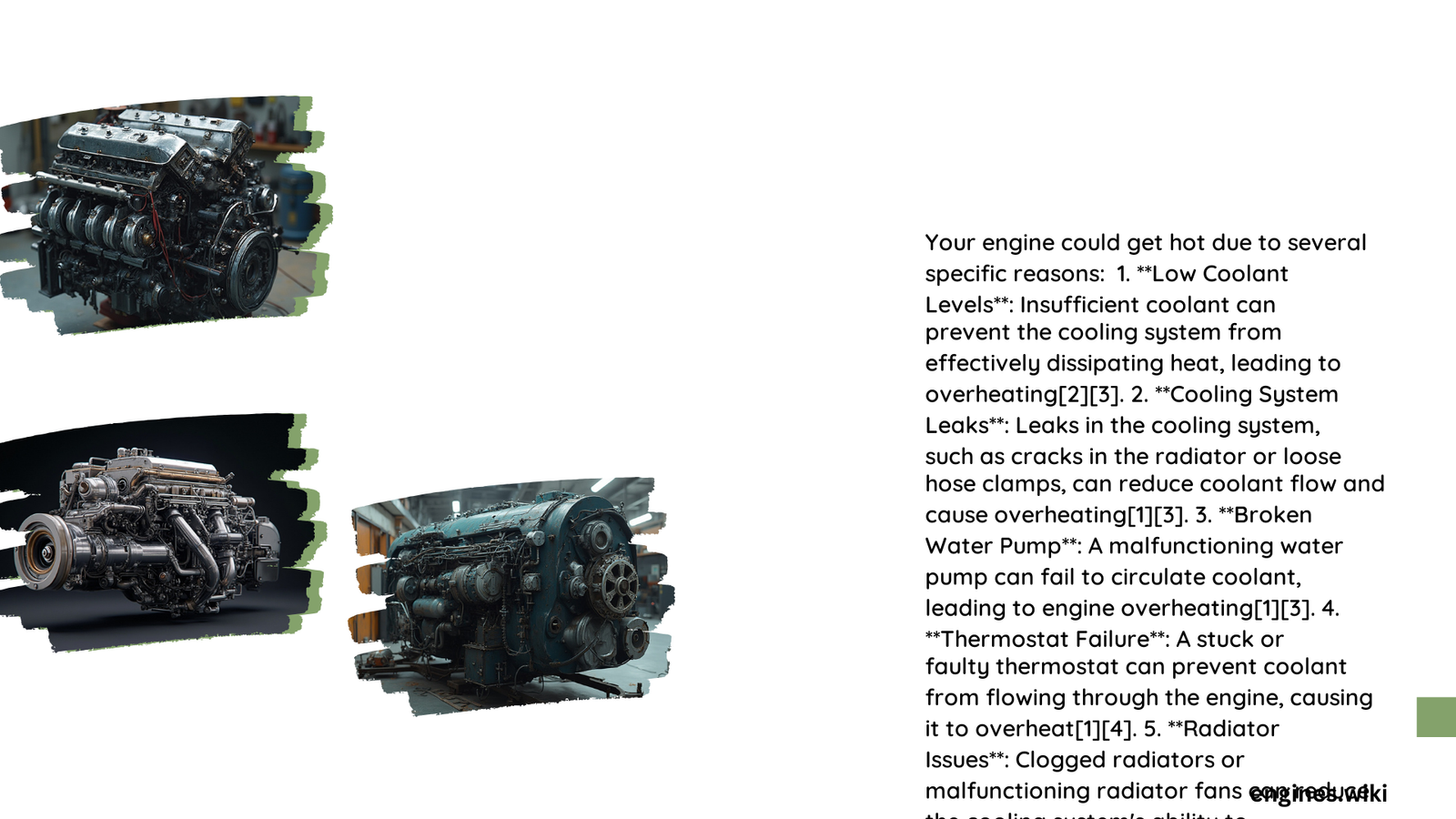Engine overheating is a common issue that can lead to severe damage if not addressed promptly. There are several reasons why your engine might get hot, including coolant leaks, thermostat failure, and radiator problems. Understanding these causes and their symptoms can help you prevent costly repairs and maintain your vehicle’s performance. This article explores the primary reasons for engine overheating and provides insights into prevention and maintenance.
Why Does Engine Temperature Matter?
Engine temperature is crucial for optimal performance and longevity. A properly functioning engine operates within a specific temperature range, typically between 195°F and 220°F. When the engine temperature exceeds this range, it can lead to various problems, including:
- Reduced engine efficiency
- Increased fuel consumption
- Premature wear of engine components
- Potential engine failure
What Are the Main Causes of Engine Overheating?

1. Coolant Leaks: How Do They Affect Engine Temperature?
Coolant leaks are a primary cause of engine overheating. When coolant escapes from the system, it reduces the amount available to absorb and dissipate heat from the engine. Common leak locations include:
- Coolant hoses
- Water pump
- Radiator
- Cylinder head gasket
- Engine block
Symptoms of coolant leaks:
– Temperature gauge readings exceeding 220°F
– Steam or vapor rising from the engine compartment
– Coolant puddles under the vehicle
– Sweet, syrupy smell from leaking coolant
Impact of low coolant levels:
– Rapid increase in engine temperature
– Potential for severe engine damage, including:
– Cracked engine block
– Warped cylinder heads
– Blown head gaskets
– Reduced engine performance and power
2. Thermostat Failure: How Does It Contribute to Overheating?
The thermostat regulates coolant flow through the engine. A malfunctioning thermostat can cause the engine to overheat by:
- Remaining closed, preventing coolant from flowing into the engine
- Staying open, preventing the engine from reaching its optimal operating temperature (less likely to cause overheating)
Symptoms of thermostat failure:
– Inconsistent temperature gauge readings
– Engine temperature remaining too low or too high
– Reduced engine performance
– Unusual engine noises (knocking or ticking sounds)
Thermostat specifications:
– Typical operating temperature range: 180°F to 200°F
– Average replacement cost (including labor): $100 to $300
3. Radiator Issues: What Problems Can Lead to Overheating?
Radiator problems, such as leaks, corrosion, or blockages, can significantly contribute to engine overheating by reducing the system’s ability to dissipate heat effectively.
Signs of radiator failure:
– Leaks in the radiator or its hoses
– Corrosion on radiator components
– Blockages in radiator fins
– Reduced airflow through the radiator
– Elevated temperature gauge readings
Importance of regular maintenance:
Regular maintenance, such as flushing the cooling system every 30,000 miles, is crucial to prevent radiator issues. This helps remove debris and corrosion that can block the radiator and reduce its cooling efficiency.
Cost implications:
– Radiator repair or replacement: $300 to $1,500
– Cost varies depending on the extent of damage and radiator type
How Can I Prevent Engine Overheating?
To prevent engine overheating and maintain your vehicle’s performance, consider the following tips:
- Regular coolant checks: Monitor coolant levels and top up when necessary.
- Scheduled maintenance: Follow your vehicle’s recommended maintenance schedule.
- Prompt repairs: Address any leaks or unusual symptoms immediately.
- Radiator care: Keep the radiator clean and free from debris.
- Thermostat replacement: Replace the thermostat as part of routine maintenance.
What Should I Do If My Engine Overheats?
If you notice signs of engine overheating:
- Safely pull over and turn off the engine.
- Allow the engine to cool down completely.
- Check coolant levels (only when the engine is cool).
- Look for visible leaks or damage.
- If safe to do so, drive to a nearby mechanic or call for roadside assistance.
By understanding the causes of engine overheating and taking preventive measures, you can protect your vehicle from costly damage and ensure its longevity. Regular maintenance and prompt attention to any unusual symptoms are key to keeping your engine running at the right temperature.
